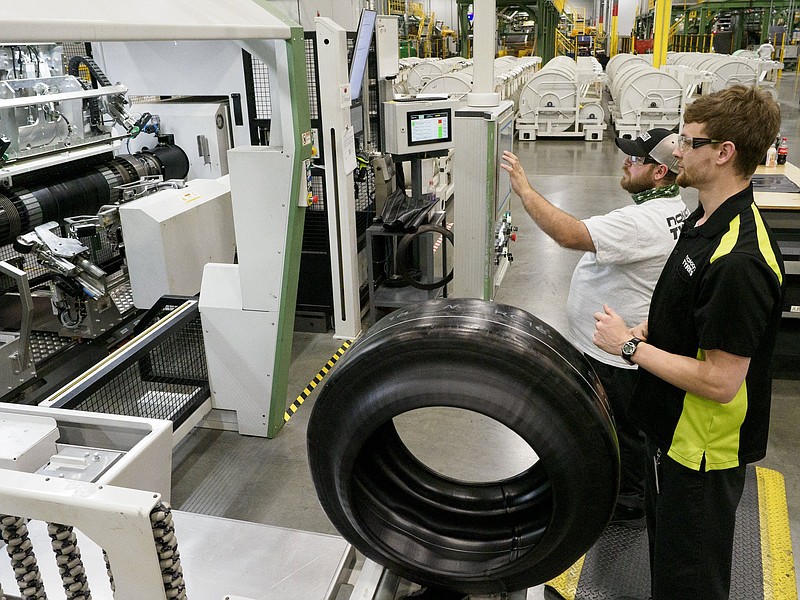When Tennessee's economic developers began recruiting Finland-based Nokian Tyres, they started with 80 sites.
Among the reasons the tire maker decided to put its only plant in the United States in Dayton, Tennessee, a few years ago was the large flat greenfield site, nearby U.S. 27, and proximity to a population center such as Chattanooga, according to Nokian.
The $360 million Southeast Tennessee facility opened in fall 2019. Nokian plans to hire about 400 employees by 2023 to produce tires and oversee operations at the Dayton factory. Officials eventually want to make as many as 4 million tires per year at the facility.
Tennessee Gov. Bill Lee, who made a part of his election campaign the effort to bring more development to rural counties, said during the $360 million factory's opening that it will "change the landscape of this community for a long time."
Small cities circling Chattanooga such as Dayton have scored big when it comes to manufacturing in recent years.
Just last December, Walker County, Georgia's biggest employer unveiled plans to get even larger. GE Appliances Roper Corp., which makes ovens and stoves, is investing another $118 million with plans to hire 646 more workers in the next couple of years.
That will put the factory outside LaFayette at nearly 2,700 workers at its sprawling 1.2 million-square-foot facility.
Stephanie Watkins, Walker County's economic development director, says the county offers the best of both worlds with is closeness to Chattanooga but small-town atmosphere.
"It's good for living and working here," she says.
Watkins says a company such as Roper "can be big in a little pond, but still have access that a larger community would provide."
In nearby Bradley County, Tennessee, its chamber of commerce landed what was then the biggest single manufacturing investment ever in the Volunteer State when German polysilicon maker Wacker decided to build a new plant there.
Wacker in mid-2016 opened a $2.5 billion plant and hired about 650 people in Charleston, Tennessee. Shortly thereafter, the company announced it would invest $150 million more in the new facility to turn a byproduct of its polysilicon factory into pyrogenic silica, a viscosity-adjusting agent in coatings, printing inks and adhesives, officials said, adding even more jobs.
Doug Berry, vice president of economic development for the Cleveland/Bradley Chamber of Commerce, says manufacturing companies appreciate factors such as a lower cost of land they can often get in smaller counties.
"Available property - that's the big thing," he says. Berry also cites the variety of sites a location offers to companies and the positioning of the tracts related to the interstate highways.
Bradley County's fairly new Spring Branch Industrial Park, for example, in 2020 attracted Cannon Automotive Services, which invested $114 million with plans to hire nearly 200 workers.
The industrial park is located at Exit 20 just off I-75, where the automotive supplier bought a 41-acre parcel for its 231,000-square-foot facility.
Berry says the county is working several other projects for the industrial park, but officials are selective due to the tight labor market.
"We're being pretty selective in who we work with as a company and community," he says. "We've been protective of the park. We have to pay attention to how much land we have to market down the road."
Manufacturing in the region
* Rhea County, Tennessee: Nokian Tyres* Bradley County, Tennessee: Wacker* Marion County, Tennessee: Lodge Cast Iron* Whitfield County, Georgia: GEDIA Automotive Group* Walker County, Georgia: Roper Appliance* Dade County, Georgia: Vanguard National Trailer Corp.
While Walker and Bradley counties each prospect for manufacturers separately, they also take part in the Greater Chattanooga Economic Partnership.
The partnership is a public-private, regional economic development entity that represents a 16-county region in Northeast Alabama, Northwest Georgia and Southeast Tennessee.
The partnership focuses on building awareness of the region for business expansion and relocation, and is an outgrowth of the Thrive 2055 regional planning effort and is managed through the Chattanooga Chamber Foundation.
Watkins says companies typically don't look at county lines when eyeing a new location or expansion.
"With our location as part of the Chattanooga Metropolitan Statistical Area, anytime we market on a regional level it's a benefit," she says.
Berry, too, says the reality is that companies don't necessarily see geographic boundaries.
"They understand that economies function on a regional level rather than county by county," he says.
READ MORE
* Online anywhere: Rural broadband gets a boost from pandemic funds and work-from-home demand
* Good bones: New life for old buildings revives small-town downtowns
